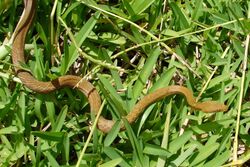Biology:Seychelles wolf snake
| Seychelles wolf snake | |
|---|---|

| |
| Scientific classification | |
| Domain: | Eukaryota |
| Kingdom: | Animalia |
| Phylum: | Chordata |
| Class: | Reptilia |
| Order: | Squamata |
| Suborder: | Serpentes |
| Family: | Colubridae |
| Genus: | Lycognathophis Boulenger, 1893 [2] |
| Species: | L. seychellensis
|
| Binomial name | |
| Lycognathophis seychellensis (Schlegel, 1837) [1]
| |
| Synonyms | |
The Seychelles wolf snake (Lycognathophis seychellensis) is a species of snake in the superfamily Colubroidea. It is monotypic within the genus Lycognathophis.[5] The Neo-Latin name, Lycognathophis, is derived from the Greek words λύκος (lykos) meaning "wolf", γνάθος (gnathos) meaning "jaw", and όφις (ophis) meaning "snake", referring to the snake's dentition.[6]
Geographic range
It is endemic to Seychelles.[1]
Description
This species has 20-22 large, subequal maxillary teeth and its anterior mandibular teeth are very large, much larger than in the posterior. Its head is very distinct from the neck. The eye is moderate, with a vertically elliptic pupil but no loreal shield. Body elongate; dorsal scales keeled, with apical pits, in 17 rows. Tail long; anal divided; subcaudals paired. Ventrals 184-202; subcaudals 92-110.
Dorsally yellowish or grayish brown, uniform or with dark brown spots; dark streak on each side of head, passing through eye; upper lip yellowish, usually with brown dots; posteriorly four series of brown spots, confluent into stripes on tail. Ventrally yellowish, usually powdered or dotted with brown; a brown spot at each outer end of anterior ventrals.
Adults may attain 1 m (40 inches) in total length, with a tail 31 cm (12 inches) long.[3]
Habitat
Its natural habitats are subtropical or tropical dry forests and subtropical or tropical moist lowland forests.
Conservation status
It is threatened by habitat loss.[1]
References
- ↑ 1.0 1.1 1.2 1.3 Gerlach, J.; Ineich, I. (2006). "Lycognathophis seychellensis". IUCN Red List of Threatened Species 2006: e.T61427A12481585. doi:10.2305/IUCN.UK.2006.RLTS.T61427A12481585.en. https://www.iucnredlist.org/species/61427/12481585. Retrieved 17 November 2021.
- ↑ "Lycognathophis". Integrated Taxonomic Information System. https://www.itis.gov/servlet/SingleRpt/SingleRpt?search_topic=TSN&search_value=700335.
- ↑ 3.0 3.1 Boulenger, G.A. 1893. Catalogue of the Snakes in the British Museum (Natural History), Volume I. London.
- ↑ The Reptile Database. www.reptile-database.org.
- ↑ "Lycognathophis seychellensis". http://reptile-database.reptarium.cz/species.php?genus=Lycognathophis&species=seychellensis.
- ↑ Mish, F.C., Editor in Chief. 2004. Merriam-Webster's Collegiate Dictionary, Eleventh Edition. Merriam-Webster. Springfield, Massachusetts.
Wikidata ☰ Q1950889 entry
 |


